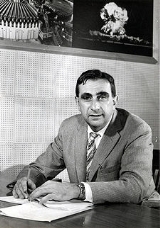
Edward Teller
Edward Teller (15 January 1908 – 9 September 2003) was an American nuclear physicist and Nobel Prize winner, known as "the father of the hydrogen bomb."
Sourced
- On May 7, a few weeks after the accident at Three-Mile Island, I was in Washington. I was there to refute some of that propaganda that Ralph Nader, Jane Fonda and their kind are spewing to the news media in their attempt to frighten people away from nuclear power. I am 71 years old, and I was working 20 hours a day. The strain was too much. The next day, I suffered a heart attack. You might say that I was the only one whose health was affected by that reactor near Harrisburg. No, that would be wrong. It was not the reactor. It was Jane Fonda. Reactors are not dangerous.
- 2 page advertisement sponsored by Dresser Industries in the Wall Street Journal (31 July 1979)
- There's no system foolproof enough to defeat a sufficiently great fool.
- Quoted in "Nuclear Reactions", by Joel Davis in Omni (May 1988)
- A fact is a simple statement that everyone believes. It is innocent, unless found guilty. A hypothesis is a novel suggestion that no one wants to believe. It is guilty, until found effective.
- Conversations on the Dark Secrets of Physics (1991) by Edward Teller, Wendy Teller and Wilson Talley, Ch. 5, p. 69 footnote.
- Two paradoxes are better than one; they may even suggest a solution.
- Conversations on the Dark Secrets of Physics (1991) by Edward Teller, Wendy Teller and Wilson Talley, Ch. 9, p. 135 footnote.
- I contributed; Ulam did not. I'm sorry I had to answer it in this abrupt way. Ulam was rightly dissatisfied with an old approach. He came to me with a part of an idea which I already had worked out and difficulty getting people to listen to. He was willing to sign a paper. When it then came to defending that paper and really putting work into it, he refused. He said, "I don't believe in it."
- On the creation of the hydrogen bomb, in "Infamy and honor at the Atomic Café : Edward Teller has no regrets about his contentious career" by Gary Stix in Scientific American (October 1999), p. 42-43.
- My name is not Strangelove. I don't know about Strangelove. I'm not interested in Strangelove. What else can I say?... Look. Say it three times more, and I throw you out of this office.
- Quoted in "Infamy and honor at the Atomic Café : Edward Teller has no regrets about his contentious career" by Gary Stix in Scientific American (October 1999), p. 42-43
- When you fight for a desperate cause and have good reasons to fight, you usually win.
- As quoted by Robert C. Martin in Software Development magazine (September 2005), p. 60
- At the end of the war, most people wanted to stop. I didn't. Because here was more knowledge. And in the coming uncerain period, with a dangerous man like Stalin around, and our incomplete knowledge, I felt that more knowledge is necessary. Among the people who knew a great deal about the hydrogen bomb, I was the only advocate of it. And that is, I think, my contribution. Not that I invented it, others would have - and others in the Soviet Union did. But I was the one person who put knowledge, and the availability of knowledge, above everything else.
- On the creation of the hydrogen bomb, in Trinity and Beyond: The Atomic Bomb Movie
Unsourced
- When you come to the end of all the light you know, and it's time to step into the darkness of the unknown, faith is knowing that one of two things shall happen: Either you will be given something solid to stand on or you will be taught to fly.
Quotes about Teller
- Business institutions universities
Both are quite the circus where the killer wants his way
I think of Edward Teller and his moribund reprise
Then I look to Nevada and I can't believe my eyes
It's time for him to die!- Bad Religion, in The Biggest Killer in American History
- It would have been a better world without Teller.
- Isidor Isaac Rabi
- After he suffered a stroke three years ago, a nurse quizzed him to probe his lucidity. "Are you the famous Edward Teller?" she queried. "No," he snapped. "I'm the infamous Edward Teller."
- Gary Stix in "Infamy and honor at the Atomic Café : Edward Teller has no regrets about his contentious career," Scientific American (October 1999), p 42-43.
